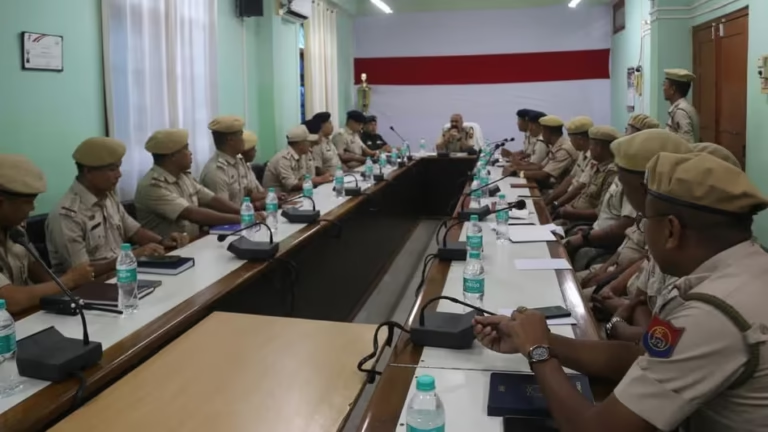Students Protest Over Delay in BOSEM Chairman Appointment in Manipur
Summary:
Students in Manipur, led by the Federal Students Organisation Manipur (FSOM), have protested over the delay in appointing a new chairman for the Board of Secondary Education Manipur (BOSEM). The lack of leadership has caused growing uncertainty among students regarding their academic future. Despite the police intervention to disperse the protestors, students have vowed to intensify their protests until the matter is addressed. The protest highlights the urgent need for effective leadership and resolution of the issue for the well-being of the student community.
Introduction: The Protests That Shook the Education Sector in Manipur
In Manipur, the issue of educational governance has been brought to the forefront by the recent protests led by students demanding the appointment of a new chairman for the Board of Secondary Education Manipur (BOSEM). This move has raised concerns not just about the administrative delays but about the ripple effects this can have on the entire academic ecosystem of the state.
The Federal Students Organisation Manipur (FSOM), one of the leading student bodies in the state, has been at the helm of these protests, seeking immediate action from the authorities. Their frustration stems from the prolonged absence of a chairman at BOSEM, which has been creating administrative bottlenecks and leaving students in limbo regarding crucial academic decisions. But what exactly has triggered this unrest? Let’s break it down.
The Impact of a Vacancy in BOSEM Leadership
The Board of Secondary Education Manipur (BOSEM) is the key administrative body responsible for overseeing the state’s secondary education system. With over 20,000 students appearing for their Class 10 and 12 exams under its supervision, BOSEM plays a pivotal role in shaping the future of Manipur’s youth. The absence of a chairman at the helm has created a vacuum, undermining the board’s ability to function efficiently.
A delay in appointing the chairman directly impacts the decision-making process, leaving critical educational policies and actions in a state of uncertainty. For instance, the non-appointment could delay the declaration of results, post-exam counseling, and the planning for upcoming examinations. This is where students begin to feel the pinch.
Why This Issue Matters More Than Just Administrative Delay
It’s easy to dismiss the appointment of a chairman as a bureaucratic issue, but the reality is far more consequential. When there is no clear leadership, decisions that impact thousands of students are left hanging. And in an environment like Manipur, where students face unique challenges due to the socio-political climate, the last thing they need is another issue to contend with.
The students protesting are not just expressing dissatisfaction; they are raising their voices against the systemic issues that affect their future. The lack of clarity and administrative oversight can lead to severe repercussions for students’ academic careers. Imagine being in the middle of preparation for crucial exams and not knowing when, or even if, they’ll take place on time. That’s the kind of stress and anxiety students are experiencing right now.
The Role of Student Unions in Advocating for Change
Student bodies like FSOM have always been at the forefront of advocating for change, but their current actions are more than just protests—they are a call for urgent reform in the educational administration. According to Kangujam Amarjit, the president of FSOM, the situation has reached a boiling point. Their attempts to lock the BOSEM office and their vow to intensify protests are indicative of the growing impatience among the youth, who feel ignored by the authorities.
The importance of student-led movements in addressing systemic issues cannot be overstated. Students are often the first to experience the impact of poor governance, and when they take to the streets, it sends a strong message that administrative negligence is no longer acceptable. This protest is a testament to their resilience and their determination to ensure that their educational prospects are not jeopardized due to bureaucratic inaction.
Understanding the Frustration of Students
The frustration among students is not merely about the absence of leadership but about the ripple effects that this delay causes. The lack of a chairman means that there is no one to enforce accountability or ensure that the board’s functions run smoothly. Important decisions regarding exam schedules, result declarations, and the management of educational resources are stalled.
Furthermore, in a time when education has become a highly competitive field, any delay in decisions can have long-term consequences on students’ futures. Whether it’s for those planning to go to college or those applying for government jobs that require academic certifications, the absence of a functioning board can be a serious obstacle.
The Need for Immediate Action
As the protests continue, the pressure on the government and concerned authorities to resolve the issue increases. Authorities are well aware of the growing dissatisfaction, and the sooner they appoint a chairman, the sooner they can restore normalcy in the academic administration of the state.
However, appointing a chairman is just one part of the solution. The government must also focus on ensuring that the processes of BOSEM are streamlined and made more transparent. It’s not just about filling a vacant position but about instilling a system that ensures future challenges are handled promptly and efficiently.
Conclusion: A Call for Accountability and Reform
The ongoing protests highlight a crucial issue—the need for responsible leadership within educational institutions. The delay in appointing a BOSEM chairman is not just an inconvenience for students but a failure of the administration to prioritize the future of its youth. These protests are not only a demand for action but a plea for accountability in a sector that holds the key to the region’s future prosperity.
As the FSOM continues its protests, it is crucial that the state government responds promptly. The time to act is now. With a system already strained, Manipur cannot afford further delays. The students have spoken; it’s time for the authorities to listen.
FAQs
- Why are students protesting over the delay in appointing a BOSEM chairman?
- The delay in appointing a chairman is causing administrative disruptions in the Board of Secondary Education Manipur, creating uncertainty for students regarding exam schedules and other academic matters.
- How has the absence of a chairman affected the functioning of BOSEM?
- The lack of a chairman has delayed important decisions related to exam dates, result declarations, and overall management of secondary education in the state.
- What actions have students taken to express their dissatisfaction?
- Students, led by the FSOM, attempted to lock the BOSEM office and have vowed to intensify their protests if their concerns are not addressed promptly.
- What role do student unions like FSOM play in this protest?
- FSOM and similar student organizations act as a voice for the student community, advocating for reforms and ensuring that their educational rights are protected.
- What needs to be done to resolve this issue?
- The government needs to appoint a chairman without further delay and ensure that BOSEM’s operations are streamlined to prevent future disruptions.



